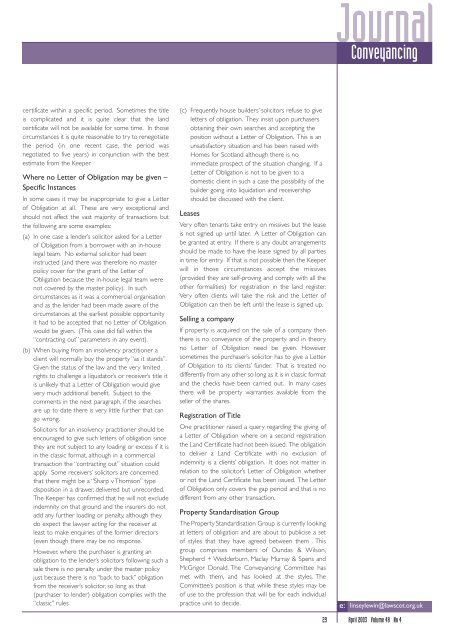Law Society of Scotland - The Journal Online
Law Society of Scotland - The Journal Online
Law Society of Scotland - The Journal Online
Create successful ePaper yourself
Turn your PDF publications into a flip-book with our unique Google optimized e-Paper software.
certificate within a specific period. Sometimes the title<br />
is complicated and it is quite clear that the land<br />
certificate will not be available for some time. In those<br />
circumstances it is quite reasonable to try to renegotiate<br />
the period (in one recent case, the period was<br />
negotiated to five years) in conjunction with the best<br />
estimate from the Keeper<br />
Where no Letter <strong>of</strong> Obligation may be given –<br />
Specific Instances<br />
In some cases it may be inappropriate to give a Letter<br />
<strong>of</strong> Obligation at all. <strong>The</strong>se are very exceptional and<br />
should not affect the vast majority <strong>of</strong> transactions but<br />
the following are some examples:<br />
(a) In one case a lender’s solicitor asked for a Letter<br />
<strong>of</strong> Obligation from a borrower with an in-house<br />
legal team. No external solicitor had been<br />
instructed (and there was therefore no master<br />
policy cover for the grant <strong>of</strong> the Letter <strong>of</strong><br />
Obligation because the in-house legal team were<br />
not covered by the master policy). In such<br />
circumstances as it was a commercial organisation<br />
and as the lender had been made aware <strong>of</strong> the<br />
circumstances at the earliest possible opportunity<br />
it had to be accepted that no Letter <strong>of</strong> Obligation<br />
would be given. (This case did fall within the<br />
“contracting out” parameters in any event).<br />
(b) When buying from an insolvency practitioner a<br />
client will normally buy the property “as it stands”.<br />
Given the status <strong>of</strong> the law and the very limited<br />
rights to challenge a liquidator’s or receiver’s title it<br />
is unlikely that a Letter <strong>of</strong> Obligation would give<br />
very much additional benefit. Subject to the<br />
comments in the next paragraph, if the searches<br />
are up to date there is very little further that can<br />
go wrong.<br />
Solicitors for an insolvency practitioner should be<br />
encouraged to give such letters <strong>of</strong> obligation since<br />
they are not subject to any loading or excess if it is<br />
in the classic format, although in a commercial<br />
transaction the “contracting out” situation could<br />
apply. Some receivers’ solicitors are concerned<br />
that there might be a “Sharp v Thomson” type<br />
disposition in a drawer, delivered but unrecorded.<br />
<strong>The</strong> Keeper has confirmed that he will not exclude<br />
indemnity on that ground and the insurers do not<br />
add any further loading or penalty, although they<br />
do expect the lawyer acting for the receiver at<br />
least to make enquiries <strong>of</strong> the former directors<br />
(even though there may be no response.<br />
However, where the purchaser is granting an<br />
obligation to the lender’s solicitors following such a<br />
sale there is no penalty under the master policy<br />
just because there is no “back to back” obligation<br />
from the receiver’s solicitor, so long as that<br />
(purchaser to lender) obligation complies with the<br />
“classic” rules.<br />
(c) Frequently house builders’ solicitors refuse to give<br />
letters <strong>of</strong> obligation. <strong>The</strong>y insist upon purchasers<br />
obtaining their own searches and accepting the<br />
position without a Letter <strong>of</strong> Obligation. This is an<br />
unsatisfactory situation and has been raised with<br />
Homes for <strong>Scotland</strong> although there is no<br />
immediate prospect <strong>of</strong> the situation changing. If a<br />
Letter <strong>of</strong> Obligation is not to be given to a<br />
domestic client in such a case the possibility <strong>of</strong> the<br />
builder going into liquidation and receivership<br />
should be discussed with the client.<br />
Leases<br />
Very <strong>of</strong>ten tenants take entry on missives but the lease<br />
is not signed up until later. A Letter <strong>of</strong> Obligation can<br />
be granted at entry. If there is any doubt arrangements<br />
should be made to have the lease signed by all parties<br />
in time for entry. If that is not possible then the Keeper<br />
will in those circumstances accept the missives<br />
(provided they are self-proving and comply with all the<br />
other formalities) for registration in the land register.<br />
Very <strong>of</strong>ten clients will take the risk and the Letter <strong>of</strong><br />
Obligation can then be left until the lease is signed up.<br />
Selling a company<br />
If property is acquired on the sale <strong>of</strong> a company then<br />
there is no conveyance <strong>of</strong> the property and in theory<br />
no Letter <strong>of</strong> Obligation need be given. However<br />
sometimes the purchaser’s solicitor has to give a Letter<br />
<strong>of</strong> Obligation to its clients’ funder. That is treated no<br />
differently from any other so long as it is in classic format<br />
and the checks have been carried out. In many cases<br />
there will be property warranties available from the<br />
seller <strong>of</strong> the shares.<br />
Registration <strong>of</strong> Title<br />
One practitioner raised a query regarding the giving <strong>of</strong><br />
a Letter <strong>of</strong> Obligation where on a second registration<br />
the Land Certificate had not been issued. <strong>The</strong> obligation<br />
to deliver a Land Certificate with no exclusion <strong>of</strong><br />
indemnity is a clients’ obligation. It does not matter in<br />
relation to the solicitor’s Letter <strong>of</strong> Obligation whether<br />
or not the Land Certificate has been issued. <strong>The</strong> Letter<br />
<strong>of</strong> Obligation only covers the gap period and that is no<br />
different from any other transaction.<br />
Property Standardisation Group<br />
<strong>The</strong> Property Standardisation Group is currently looking<br />
at letters <strong>of</strong> obligation and are about to publicise a set<br />
<strong>of</strong> styles that they have agreed between them . This<br />
group comprises members <strong>of</strong> Dundas & Wilson,<br />
Shepherd + Wedderburn, Maclay Murray & Spens and<br />
McGrigor Donald. <strong>The</strong> Conveyancing Committee has<br />
met with them, and has looked at the styles. <strong>The</strong><br />
Committee’s position is that while these styles may be<br />
<strong>of</strong> use to the pr<strong>of</strong>ession that will be for each individual<br />
practice unit to decide.<br />
<strong>Journal</strong><br />
Conveyancing<br />
e:<br />
linseylewin@lawscot.org.uk<br />
29 April 2003 Volume 48 No 4










